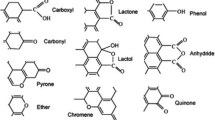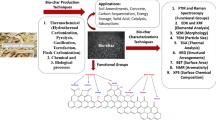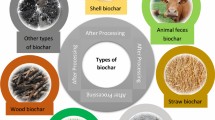Abstract
Banana peduncle waste (BPW) is a major fibrous waste generated from the wholesale vegetable markets in urban areas that is less degradable due to the presence of cellulose, hemicellulose and lignin contents. In order to recover energy and produce biochar as a by-product, pyrolysis is a promising alternate method for the treatment and disposal of BPW. The novel aspect of the study is to use response surface methodology (RSM) with central composite design by Minitab Software to identify the optimum process parameters, such as pyrolysis temperature (PT), holding time (HT), and heating rate (HR) for the responses biochar yield (%), carbon content (g), and pH of the biochar. For RSM the minimum and maximum values are considered in the range of 400–600 °C, 80–240 min and 10–20 °C min−1 for PT, HT and HR, respectively. Experiments of 20 sets at different parameters as per RSM were carried out in lab scale pyrolysis unit and results showed that PT and HT have a significant effect on biochar yield, carbon content and pH, while HR did not show a considerable impact. The proximate and ultimate analyses of BPW and biochar obtained (BPW–BC) were also investigated including SEM and FTIR. From the results, biochar yield of 50%, carbon content of 3.18 g and pH of 11 were obtained at optimum conditions of PT: 462 °C, HT: 80 min and HR-10 °C min−1 and found that the experimental responses are very close to the predicted values. Further, the characteristics of BPW–BC obtained vary with process conditions and could be potentially used for various applications such as soil conditioners, adsorbent pyrogenic carbon capture and storage.







Similar content being viewed by others
Data availability
Data sharing is not applicable to this article.
References
Allohverdi T, Mohanty AK, Roy P, Misra M (2021) A review on current status of biochar uses in agriculture. Molecules. https://doi.org/10.3390/molecules26185584
Angın D (2013) Effect of pyrolysis temperature and heating rate on biochar obtained from pyrolysis of safflower seed press cake. Bioresour Technol 128:593–597. https://doi.org/10.1016/j.biortech.2012.10.150
Azmier M, Azreen N, Puad A, Solomon O (2014) Kinetic, equilibrium and thermodynamic studies of synthetic dye removal using pomegranate peel activated carbon prepared by microwave-induced KOH activation. Water Resour Ind. https://doi.org/10.1016/j.wri.2014.06.002
Barrera-zapata R (2017) Morphological and physicochemical characterization of biochar produced by gasification of selected forestry species. Caracterización Morfológica y Fisico-Química de Biocarbones Producidos 26(46):123–130
Beis SH, Onay Ö, Koçkar ÖM (2002) Fixed-bed pyrolysis of safflower seed: Influence of pyrolysis parameters on product yields and compositions. Renew Energy 26(1):21–32. https://doi.org/10.1016/S0960-1481(01)00109-4
Benish PMR, Mozhiarasi V, Nagabalaji V, Weichgrebe D, Srinivasan SV (2022) Optimization of process parameters for enhanced methane production from banana peduncle by thermal pretreatment. Biomass Convers Biorefin. https://doi.org/10.1007/s13399-022-02917-z
Brown JN, Brown RC (2012) Process optimization of an auger pyrolyzer with heat carrier using response surface methodology. Bioresour Technol 103(1):405–414. https://doi.org/10.1016/j.biortech.2011.09.117
Cao X, Harris W (2010) Properties of dairy-manure-derived biochar pertinent to its potential use in remediation. Bioresour Technol 101(14):5222–5228. https://doi.org/10.1016/j.biortech.2010.02.052
Dhyani V, Bhaskar T (2018) A comprehensive review on the pyrolysis of lignocellulosic biomass. Renew Energy 129:695–716. https://doi.org/10.1016/j.renene.2017.04.035
El-Naggar A, Lee SS, Rinklebe J, Farooq M, Song H, Sarmah AK, Zimmerman AR, Ahmad M, Shaheen SM, Ok YS (2019) Biochar application to low fertility soils: a review of current status, and future prospects. Geoderma 337(September 2018):536–554. https://doi.org/10.1016/j.geoderma.2018.09.034
Geng N, Kang X, Yan X, Yin N, Wang H, Pan H, Yang Q, Lou Y, Zhuge Y (2022) Biochar mitigation of soil acidification and carbon sequestration is influenced by materials and temperature. Ecotoxicol Environ Saf 232:113241. https://doi.org/10.1016/j.ecoenv.2022.113241
Han X, Jiang N, Jin F, Reddy KR, Wang Y, Liu K, Du Y (2022) Effects of biochar-amended alkali-activated slag on the stabilization of coral sand in coastal areas. J Rock Mech Geotech Eng. https://doi.org/10.1016/j.jrmge.2022.04.010
Haryati Z, Loh SK, Kong SH, Bachmann RT (2018) Pilot scale biochar production from palm kernel shell (PKS) in a fixed bed allothermal reactor. J Oil Palm Res 30(3):485–494. https://doi.org/10.21894/jopr.2018.0043
Isahak WNRW, Hisham MWM, Yarmo MA, Yun Hin TY (2012) A review on bio-oil production from biomass by using pyrolysis method. Renew Sustain Energy Rev 16(8):5910–5923. https://doi.org/10.1016/j.rser.2012.05.039
Izadiyan P, Hemmateenejad B (2016) Multi-response optimization of factors affecting ultrasonic assisted extraction from Iranian basil using central composite design. Food Chem 190:864–870. https://doi.org/10.1016/j.foodchem.2015.06.036
Jacoby R, Peukert M, Succurro A, Koprivova A, Kopriva S (2017) The role of soil microorganisms in plant mineral nutrition—current knowledge and future directions. Front Plant Sci. https://doi.org/10.3389/fpls.2017.01617
Johns C (2017) Living soils: the role of microorganisms in soil health. Future Directions International, June, 7. https://www.futuredirections.org.au/publication/living-soils-role-microorganisms-soil-health/
Karim AA, Kumar M, Singh SK, Panda CR, Mishra BK (2017) Potassium enriched biochar production by thermal plasma processing of banana peduncle for soil application. J Anal Appl Pyrol. https://doi.org/10.1016/j.jaap.2016.12.009
Kumar AK, Sharma S (2017) Recent updates on different methods of pretreatment of lignocellulosic feedstocks: a review. Bioresour Bioprocess. https://doi.org/10.1186/s40643-017-0137-9
Ma X, Zhou B, Budai A, Jeng A, Hao X, Wei D, Zhang Y, Rasse D (2016) Study of biochar properties by scanning electron microscope—energy dispersive X-ray spectroscopy (SEM-EDX). Commun Soil Sci Plant Anal 47(5):593–601. https://doi.org/10.1080/00103624.2016.1146742
Manimaran P, Pillai GP, Vignesh V, Prithiviraj M (2020) Characterization of natural cellulosic fibers from Nendran Banana Peduncle plants. Int J Biol Macromol. https://doi.org/10.1016/j.ijbiomac.2020.08.111
Mohamed Noor N, Shariff A, Abdullah N, Mohamad Aziz NS (2019) Temperature effect on biochar properties from slow pyrolysis of coconut flesh waste. Malays J Fundam Appl Sci 15(2):153–158. https://doi.org/10.11113/mjfas.v15n2.1015
Mohan D, Pittman CU, Steele PH (2006) Pyrolysis of wood/biomass for bio-oil: a critical review. Energy Fuels 4:848–889
Pang J, Zheng M, Wang A, Sun R, Wang H, Jiang Y, Zhang T (2014) Catalytic conversion of concentrated miscanthus in water for ethylene glycol production. AIChE J 60(6):2254–2262. https://doi.org/10.1002/aic
Pazmiño-Hernandez M, Moreira CM, Pullammanappallil P (2019) Feasibility assessment of waste banana peduncle as feedstock for biofuel production. Biofuels 10(4):473–484. https://doi.org/10.1080/17597269.2017.1323321
Qian K, Kumar A, Patil K, Bellmer D, Wang D, Yuan W, Huhnke RL (2013) Effects of biomass feedstocks and gasification conditions on the physiochemical properties of char. Energies. https://doi.org/10.3390/en6083972
Rajkovich S, Enders A, Hanley K, Hyland C, Zimmerman AR (2012) Corn growth and nitrogen nutrition after additions of biochars with varying properties to a temperate soil. Biol Fertil Soils. https://doi.org/10.1007/s00374-011-0624-7
Römheld V, Kirkby EA (2010) Research on potassium in agriculture: needs and prospects. Plant Soil 335(1):155–180. https://doi.org/10.1007/s11104-010-0520-1
Ronsse F, van Hecke S, Dickinson D, Prins W (2013) Production and characterization of slow pyrolysis biochar: influence of feedstock type and pyrolysis conditions. GCB Bioenergy 5(2):104–115. https://doi.org/10.1111/gcbb.12018
Safdari M, Amini E, Weise DR, Fletcher TH (2019) Heating rate and temperature effects on pyrolysis products from live wildland fuels. Fuel 242:295–304. https://doi.org/10.1016/j.fuel.2019.01.040
Sevgi S (2015) Pyrolysis of hornbeam shell (Carpinus betulus L.) in a fixed bed reactor: characterization of bio-oil and bio-char. Fuel 150:672–678. https://doi.org/10.1016/j.fuel.2015.02.095
Shafiq U (2017) Proximate analysis of low and high quality pure coal and their blends from Pakistan. Austin Chem Eng 4(1):2–5. https://doi.org/10.26420/austinchemeng.2017.1048
Siddiqui MTH (2017) Characterization and process optimization of biochar produced using novel biomass, waste pomegranate peel: a response surface methodology approach. Waste Biomass Valoriz. https://doi.org/10.1007/s12649-017-0091-y
Soderqvist H (2019) Carbon stability of biochar. Degree Proj Energy Environ Second Cycle, 30 Credit Stock SWEDEN2019
Soja G, Bielsk L (2021) Biochar surface functional groups as affected by biomass feedstock, biochar composition and pyrolysis temperature. Carbon Resour Convers 4(November 2020):36–46. https://doi.org/10.1016/j.crcon.2021.01.003
Street EM (2010) Supercritical ethanol liquefaction of swine manure for bio-oils production. Am J Eng Appl Sci 3(2):494–500
Suravi KN, Attenborough K, Taherzadeh S, Macdonald AJ, Powlson DS, Ashton RW, Whalley WR (2021) The effect of organic carbon content on soil compression characteristics. Soil Tillage Res 209(February):104975. https://doi.org/10.1016/j.still.2021.104975
Te WZ, Muhanin KNM, Chu YM, Selvarajoo A, Singh A, Ahmed SF, Vo DVN, Show PL (2021) Optimization of pyrolysis parameters for production of biochar from banana peels: evaluation of biochar application on the growth of Ipomoea aquatica. Front Energy Res. https://doi.org/10.3389/fenrg.2020.637846
Tomczyk A, Sokołowska Z, Boguta P (2020) Biochar physicochemical properties: pyrolysis temperature and feedstock kind effects. Rev Environ Sci Biotechnol 19(1):191–215. https://doi.org/10.1007/s11157-020-09523-3
Uddin MN, Techato K, Taweekun J, Rahman MM, Rasul MG, Mahlia TMI, Ashrafur SM (2018) An overview of recent developments in biomass pyrolysis technologies. Energies. https://doi.org/10.3390/en11113115
Uzun B, Apaydin-varol E, Ates F, Pütün E (2010) Synthetic Fuel Production from Tea Waste : Characterisation of Bio-Oil and Bio-Char 89:176–184. https://doi.org/10.1016/j.fuel.2009.08.040
Wang K, Peng N, Lu G, Dang Z (2018) Effects of pyrolysis temperature and holding time on physicochemical properties of swine-manure-derived biochar. Waste Biomass Valoriz. https://doi.org/10.1007/s12649-018-0435-2
Wati (2019) Pyrolysis of banana pseudo-stem and leaf through fast and slow processes in producing bio-char and bio-oil. Αγαη 8(5):55
Weber K, Quicker P (2018) Properties of biochar. Fuel 217(December 2017):240–261. https://doi.org/10.1016/j.fuel.2017.12.054
Wong JE, Muñiz DB, Martínez GCG, Belmares RE, Aguilar CN (2015) Ultrasonics sonochemistry ultrasound-assisted extraction of polyphenols from native plants in the Mexican desert. Ultrason Sonochem 22:474–481. https://doi.org/10.1016/j.ultsonch.2014.06.001
Workneh TS, Belew D (2013) Review on postharvest technology of banana fruit. Afr J Biotech 12(7):658–664. https://doi.org/10.5897/AJB12.2015
Yu J, Song M, Li Z (2022) Optimization of biochar preparation process and carbon sequestration effect of pruned wolfberry branches. Green Process Synth 11(1):423–434. https://doi.org/10.1515/gps-2022-0044
Zea S, Biochar L, Capture C, Bachmann RT, Rafiq MK, Bachmann RT, Rafiq MT (2016) Influence of pyrolysis temperature on physico-chemical properties of corn influence of pyrolysis temperature on physico-chemical properties of corn stover (Zea mays L.) biochar and feasibility for carbon capture and energy balance. Bioresour Technol. https://doi.org/10.1371/journal.pone.0156894
Zhang J, Kan X, Shen Y, Loh KC, Wang CH, Dai Y, Tong YW (2018) A hybrid biological and thermal waste-to-energy system with heat energy recovery and utilization for solid organic waste treatment. Energy 152:214–222. https://doi.org/10.1016/j.energy.2018.03.143
Zhao B, O’Connor D, Zhang J, Peng T, Shen Z, Tsang DCW, Hou D (2018) Effect of pyrolysis temperature, heating rate, and residence time on rapeseed stem derived biochar. J Clean Prod 174:977–987. https://doi.org/10.1016/j.jclepro.2017.11.013
Zhao J, Wang D, Pidlisnyuk V, Erickson LE (2021) Miscanthus biomass for alternative energy production. Phytotechnol Biomass Prod. https://doi.org/10.1201/9781003082613-10
Zheng H, Wang Z, Deng X, Xing B (2013) Impact of pyrolysis temperature on nutrient properties of biochar. Funct Nat Org Matter Chang Environ 9789400756:975–978. https://doi.org/10.1007/978-94-007-5634-2_179
Zornoza R, Moreno-Barriga F, Acosta JA, Muñoz MA, Faz A (2016) Stability, nutrient availability and hydrophobicity of biochars derived from manure, crop residues, and municipal solid waste for their use as soil amendments. Chemosphere 144:122–130. https://doi.org/10.1016/j.chemosphere.2015.08.046
Acknowledgements
The authors are grateful to Director, CSIR-Central Leather Research Institute (CLRI), for providing the laboratory facilities and permitting this research work. The authors also thank Indian and German Industrial partners (M/s. Ramky Enviro Engineers Ltd., India, and M/s. Biomacon Gmbh, Germany) for their support in this 2+2 PYRaSOL project. The authors also acknowledge ISAH team, Leibniz University, Hannover, Germany, for their technical support for this work. The CSIR-CLRI Communication number is 1673. This research work is carried as a part of the PhD programme of the candidate M/s. R. Nishanthi, registered under Anna University, Chennai, India.
Funding
This work was funded by Indo-German Science and Technology Centre (IGSTC), New Delhi, a joint initiative of the Department of Science and Technology (DST), Government of India, and the Federal Ministry of Education and Research (BMBF), Germany, under 2 + 2 Project “Smart Cities integrated energy supply, carbon sequestration and urban organic waste treatment through combined solar sludge drying and pyrolysis (PYRaSOL)” (Funding code: 01DQ18001A).
Author information
Authors and Affiliations
Contributions
NR was involved in methodology, data curation, validation, original draft preparation; SG was involved in data curation, investigation; SSV and DW were involved in conceptualization, supervision, validation and review and editing.
Corresponding author
Ethics declarations
Conflict of interest
The authors declare that they have no known competing financial interests or personal relationships that could have appeared to influence the work reported in this paper entitled “Optimization of Pyrolysis process parameters for the production of biochar from Banana peduncle fibrous waste and its Characterization.”
Ethics approval
The above study was carried out using the waste collected from the market. Hence, ethical approval is not applicable.
Additional information
Publisher's Note
Springer Nature remains neutral with regard to jurisdictional claims in published maps and institutional affiliations.
Rights and permissions
Springer Nature or its licensor (e.g. a society or other partner) holds exclusive rights to this article under a publishing agreement with the author(s) or other rightsholder(s); author self-archiving of the accepted manuscript version of this article is solely governed by the terms of such publishing agreement and applicable law.
About this article
Cite this article
Rajendiran, N., Ganesan, S., Weichgrebe, D. et al. Optimization of pyrolysis process parameters for the production of biochar from banana peduncle fibrous waste and its characterization. Clean Techn Environ Policy 25, 3189–3201 (2023). https://doi.org/10.1007/s10098-023-02592-2
Received:
Accepted:
Published:
Issue Date:
DOI: https://doi.org/10.1007/s10098-023-02592-2




